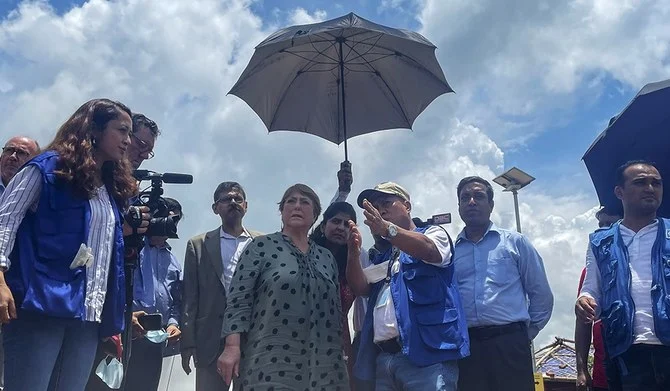
- ARAB NEWS
- 18 Jul 2025

The prime minister of Bangladesh, Sheikh Hasina, last month made a demand of the outgoing UN high commissioner for human rights. She told Michelle Bachelet, as she toured the refugee camps of Cox’s Bazar, where more than a million displaced Rohingya are housed, that they must return to the country that expelled them and committed a genocide against them.
Hasina’s press secretary, Ihsanul Karim, told the media that the prime minister had said to Bachelet: “The Rohingya are nationals of Myanmar and they have to be taken back.” This might sound reasonable, but in practice it is a difficult demand.
The Rohingya were thrown out of Myanmar at the barrel of a gun. Their villages were razed to the ground. Thousands of them were murdered. Uncountable numbers of women were raped by the Myanmar military. All of this was intended to drive them from the country — and it succeeded.
Long second-class citizens within Myanmar — where they were pejoratively called “Bengalis” and told they did not belong — many Rohingya had their citizenship documents either taken from them or destroyed by the military.
Any attempt to “return” the Rohingya to Myanmar would be resisted by the very military that committed genocide against them. It would lead to more violence and suffering, and it would not solve the problem.
Not only that, but in Myanmar since this stage of the genocide began in 2017, a government has been overthrown, political leaders have been jailed and a large-scale civil war has broken out between the military and supporters of the former government, who are allied with minority ethnic groups, individual militias and other fighters. This is a profoundly dangerous time, with reprisals from the military falling especially hard on the Rohingya still in the country.
The civil war is not winding down. To suggest that the Rohingya must return in spite of it is dangerous.
But far from saying this to Hasina, Bachelet demurred from saying so. “Unfortunately, the current situation across the border means that the conditions are not right for returns,” Bachelet said to the press in Dhaka. Compounding her error, Bachelet said that “repatriation must always be conducted in a voluntary and dignified manner, only when safe and sustainable conditions exist in Myanmar.”
To understand why this rhetoric is so dangerous, we need, momentarily, to concede the point to Hasina. Bangladesh is a poor country. Refugees cannot work, for fear they would undercut the price of local labor and create unemployment. The expense of housing and feeding a million people is not inconsiderable.
And this is why Bachelet made such an error. She gave too much ground at the first time of asking. She accepted that the repatriation of a people who are victims of genocide should be considered when “conditions are right” — presumably when the civil war is less bloody. And she attached the meaningless appellations of “voluntary” and “dignified” to an action that would constitute a second expulsion.
Many Rohingya dislike their conditions. They have been trapped in the slow lane of a foreign country — amid poverty, poor conditions and crime — for five years. If circumstances permitted it, many of them would return to Myanmar of their own volition. But conditions do not permit it, and likely will not for many years.
The genocidal government may have fractured, but those who committed the genocide still have all the weaponry. Their intent to destroy the Rohingya and drive them from Myanmar is unaffected by other internal conflicts. It has continued in this time of civil war.
So long as the generals are in power, any talk of repatriating the Rohingya is either an evasive reference to the impossible or a dreadful demand that could only break international agreements and force further suffering on the victims of genocide.
Any attempt to ‘return’ the Rohingya to Myanmar would be resisted by the very military that committed genocide against them.
Dr. Azeem Ibrahim
That Bachelet heard all of this and not only failed to say these things, but essentially conceded the ground to Hasina’s arguments, is damaging. It is the product of a UN system too in hock to the formalities of listening to the grievances of national leaders rather than telling them when their demands are not viable.
The UN should be leading international efforts to ensure that Bangladesh does not have to bear this burden on its own. Why should Bangladesh have to house a million Rohingya refugees at a cost of more than a billion dollars a year due to a problem not of their making? Until conditions are sufficiently safe for the Rohingya to return to their homeland, the UN should facilitate a burden-sharing program with countries in the region. Granted, most countries will not be too keen on this, but it would hopefully only be a temporary measure while all host countries work to create conditions suitable for the eventual return of the Rohingya. That is something the Rohingya want more than anyone.